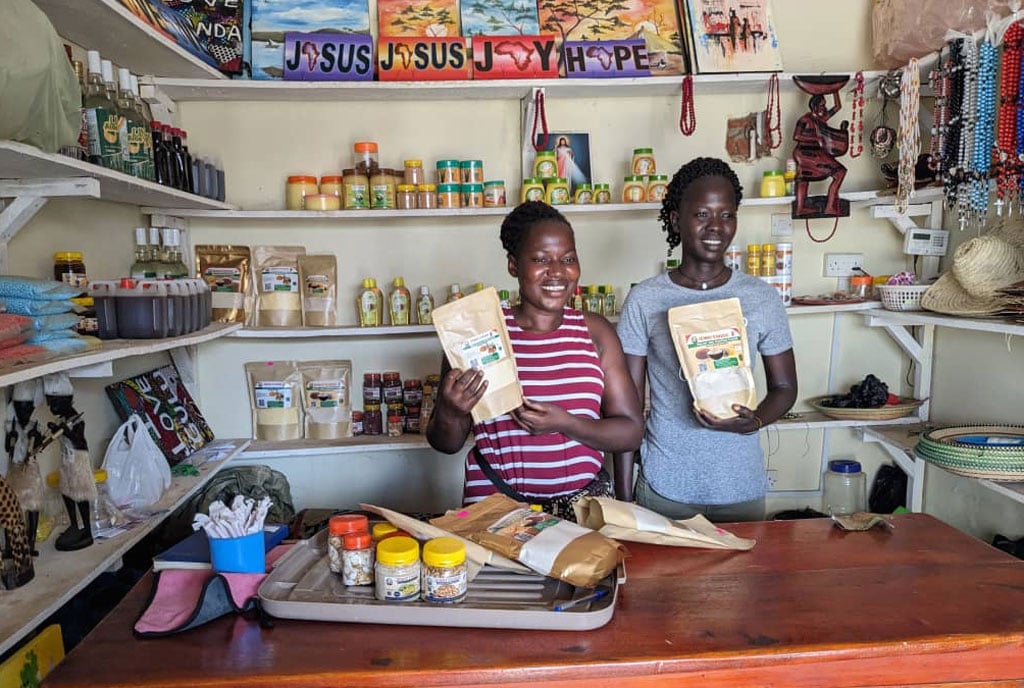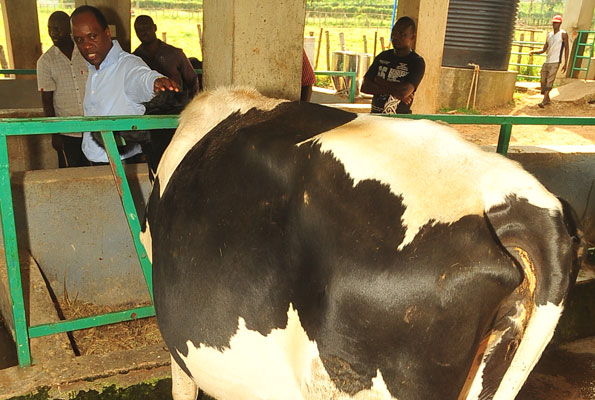Prime
Youth earn more money with value addition

Youth display some of their products. PHOTO/DEUS BUGEMBE
What you need to know:
- Fish farming is taking root throughout the country and Joshua Mooya saw an opportunity to produce floating pellet feeds to supply the farmers in Mbale and other places of eastern Uganda.
The value addition gospel has been preached from all corners of the world, especially in agribusiness.
On the ground, it is taking shape amidst challenges ranging from limited capital to skills, but, in Mbale, young entrepreneurs have really embraced it and are vowing to keep their heads above the water and swim across.
Young entrepreneurs have engaged themselves in the agriculture value chain business like never before. Gone are the days of searching for white collar jobs until the cows come home.
Today, some are actually running away from those jobs to immerse themselves fully into agribusiness or try to juggle both.
Nabwire makes porridge, green tea
This calls for creativity in order to survive through the ever-changing dynamics of agribusiness. Take Samalie Nabwire for example. A professional teacher of Art and Industrial Design at Kyambogo University who resigned in the aftermath of the Covid-19 lockdowns to concentrate on her business.
Under her SamaliWellness company in Nakaloke, on the outskirts of Mbale town, Nabwire started processing instant porridge and detox tea in 2019. For her this was just for her family and a few friends.
But when Covid-19 struck, she was locked up in Kampala and by the time she returned home she had spent all the money. Schools had been hit hard. She resigned in 2022.
That is how Bubwene Organic Nutri-Rich Foods was born, with fermented and non-fermented porridge, energy bites and other snacks as the key products.
Along the way, luck struck for Nabwire and a host of other agribusiness entrepreneurs.
In 2022, Generation Food programme, Rikolto, an international NGO aiming at food system improvement, and Shona East Africa, a Ugandan based incubator and accelerator, orchestrated a grand plan in Mbale and Gulu where more than 100 youth in agriculture were taken into a hackathon programme and the top 25 landed themselves a training and mentorship opportunity focused on improving their general business skills and co-create innovative and inclusive solutions within the agricultural value chain.
Through this arrangement, Nabwire and her cohort were last month visited by marketing and sales experts from Shona and taken through the modern-day marketing and sales dynamics in the business.
Businesses
Stephen Tumukugize, a coffee quality specialist, is the team lead and founder of Darling Coffee. His company sources coffee beans from more than 400 small holder farmers, and his market ranges between local roasters and small-scale exporters.
He also roasts and grinds and packs for his clientele which includes hotels and coffee shops. On top of that, he also does coffee brewing at functions, which he says is the first of its kind in Mbale.
For Tumukugize, whereas green coffee beans account for almost 60 percent of Darling Coffee’s revenue from exports, it is unwise to entirely rely on it because it is seasonal.
He is pushing hard on the roasted beans and ground coffee, which account for the remaining 40 percent. His target is to promote domestic consumption of coffee because he believes the market should start from his doorstep.
Prices
“People are open to the idea of consuming the products but you have to be aggressive in regard to research. For instance, here we pack coffee in different volumes and the smallest packet (50g for Shs3000) is the one they buy a lot. It took us time to appreciate the irony of the smallest pack being our cash cow,” reveals Tumukugize.
It is on that note that Dennis Dokoria, the marketing specialist from Shona, advised Tumukugize to add even a smaller sachet for as low as Shs1000.
“Make it possible and affordable for each and every person to buy and drink your coffee. Also, go hard on social media marketing and record captivating adverts on local radio stations in the local dialects.”

In Gulu, Samuel Ariho runs a vegetable farm on 2.5 acres. He grows green pepper, carrots, tomatoes and cabbage. He credits Shona for giving him training on business management and production as well as marketing. He is picking up but has some hiccups. Animals and residents have made it a habit to destroy his crops while he also longs for a reliable water source for consistent production.
“The market is available but the product is not always available because of lack of enough water on top of dealing with residents who steal my produce,” he told Seeds of Gold.
Good harvest
In a good season, Ariho can harvest 10 bags of green pepper a week from half an acre, giving him about Shs800,000. The numbers can get better and with value addition, he believes he will get there.
Priscilla is the founder of Abraham’s Cereal. She is into food processing. She bakes and makes cornflakes and snacks out of dehydrated/sun dried fruits like pineapples, jackfruits and bananas.
She adds no sugars, and thus, categorizes her products as “healthy products” for children and working-class mothers who have no time to prepare heavy meals.
The ingredients include oats, sunflower seeds, pumpkin seeds, honey, almonds and sesame (simsim) among others. Dokoria challenged her to also cater for those interested in sugary products.
“Your idea of sugarless products is good. But you will find that some people prefer those with sugar so you will have to have them as well,” he implored her. For David Wabukye, there was a need to be the trusted link between farmer and consumer. He started and runs Food Sitoowa, a one stop venture for foodstuffs: fresh foods, fruits, and dry rations like rice, beans, groundnuts and a retail shop called Sitoowa Shoppers in Mbale Town.
Wabukye reckons that they are uniquely placed in the market, acting as the link between the farmer and consumer.
“We source the best quality produce from the farmer’s garden, stock at our place and then deliver to our clients,” he reveals.
Wabukye is optimistic that with a steady availability of fresh products, he can go further. But the challenges abound. Nonpayment from some clients, hardships in transport to faraway places, are some of those.

A farmer explains how to pick more cash with value addition. PHOTO/DEUS BUGEMBE
Fish farming is taking root throughout the country and Joshua Mooya saw an opportunity to produce floating pellet feeds to supply the farmers in Mbale and other places of Eastern Uganda.
Research showed that fish prefers to Nick the feeds when they are floating, than feeding from underwater.
Animal feeds
Bamuk Feeds, his company, produces both plant and animal meat based feeds to cater for both herbivorous and carnivorous fish species. Tilapia and Mirror Carp are herbivores while Catfish is more carnivorous.
Bamuk Feeds also produces powder feeds for starter fish. In collaboration with District Fishery Officers (DFOs), Mooya also extends free consultation services to fish farmers. He also produces poultry and piggery feeds but majorly leans towards the fish feeds market.
Jennifer Anena in Gulu, proprietor of Jenny Pumpkin Nutrition deals in pumpkin flour, pumpkin seeds, pumpkin soy flour, millet flour to make a living. Her inspiration comes from a near-death experience that had her poisoned. Pumpkin flour as a herb, saved her life and she never looked back. She dreams of supplying the entire country in the near future but it will call for more resources. Her own milling machine would do the trick, it would save her the burden of hiring to get her products ready on time for delivery.
Challenges
Nearly all farmers will point to limited capital as their biggest hindrance. In Mooya’s case for example, his machines keep breaking down and production slows. But beyond that, other challenges stand out in plenty. Especially in the field of marketing and product branding.
However, Dokoria and Paul Ssengooba, the experts from Shona, took these farmers through a detailed marketing and branding mentorship which opened their eyes to the modern way of positioning themselves strategically ahead of competition.
Most of these farmers found it difficult to even know who their targeted clients were. Then, how to best serve them, and how to keep them updated with the latest on the shelves.
“Social media, for example, is here to stay. And it’s changing the business marketing landscape. Today’s client is very impatient and if they check you’re catalog and some product is missing, they will quickly jump onto the other suppliers,” noted Dokoria.
He implored these farmers to always update their catalog, keep their lines open to new trends and pounce.
Good harvest
In a good season, Ariho can harvest 10 bags of green pepper a week from half an acre, giving him about Shs800,000. The numbers can get better and with value addition, he believes he will get there.




